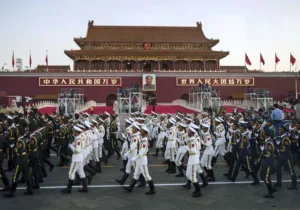One of Christian civilization’s greatest accomplishments is the legal and social equality of women, achieved slowly across many centuries. It was present in Jesus’s subversive interactions with women, treating them not as property or subordinates but human equals. This subversive example insinuated itself into the Gospel wherever heeded. And the narrative became a social reality, long in coming.
This message of equality for women of course transmitted wherever Christian originated ideals about human rights were expounded. The last Shah of Iran was overthrown in 1979 in an Islamist revolution partly because his “secularizing” influence had uplifted the rights of Iranian women. Ayatollah Khomeini’s rabid followers saw the Shah as a puppet of the West and of America particularly. Under the subsequent theocracy, women have been subordinated to Islamism as interpreted by the clerics. By law, Iranian women must wear a hijab, or head covering, to cover their hair and neck, as enforced by Iran’s religious or “morality” police.
In September, 22-year-old Mahsa Amini died after arrest by those police for having worn her hijab “improperly.” There has been renewed hijab enforcement since the presidential election of Islamist hardliner Ebrahim Raisi last year. Amini’s death ignited months of mass protests against the regime, leading to nearly 16,000 arrests and several hundred dead, including dozens of children. One protester, accused of arson against a government building, has been sentenced to death, accused of “enmity against God” and “spreading corruption on Earth.” Sometimes protesters chant “woman, life, freedom.” The widespread unrest evinces the widespread unpopularity of Islamist rule in Iran after 43 years. It may mark the beginning of the end for that theocracy, which from the start has identified itself by its hatreds.
Amini was taken by police to be “re-educated,” during which they claim the young woman had a heart attack. Her family credibly believes she died from the police having severely beaten her while in a police van. What kind of regime and laws lead to such violence and hatred against a female for only having failed to don her headscarf correctly? Iran’s women have lived under this system across five decades with little recourse. But in response to Amini’s death thousands of women have marched in the streets, removing and often burning their headscarves. The police have often reacted with violence and mass detentions, sometimes including threats of rape. Such threats are no surprise for a theocracy that objectifies women as sexual objects whose hair and necks are too dangerous to be exposed.
Of course, journalists in Iran reporting on these protests have themselves been arrested as threats to national security. The arrests are quite understandable. Truth telling is subversive to all tyrannies, especially theocracies that insist that only their truth claims are valid. CNN’s Christiane Amanpour, who’s of Iranian ancestry, was to have interviewed Iran’s president while he was in New York to speak at the United Nations. But she refused his stipulation that she must wear a headscarf during the interview, pointing out that New York, unlike Iran, has no such requirement. Good for her.
Predictably, Iran’s chief cleric, Ayatollah Ali Khamenei, faults the anti-regime and anti-headscarf protests on America and Israel: “These riots and insecurities were designed by America and the Zionist regime and their employees.” Iran’s theocracy has from the start defined itself by hatred for America and Israel, amid chants of “death to…” And every major threat to the regime is demonized accordingly.
The theocracy is sustained, among other police state horrors, by a network of millions of women spies called Sisters’ Basij, who are expected to report on any perceived subversion, especially by women. These spies gain payment and privilege for their service, just as spies for all totalitarian regimes do. But apparently there are some signs that even some regime spies are influenced by the women-led protests since Amini’s death. All dictatorships rely on fear and the assumption that their power is permanent. If that power seems to ebb, many ostensible supporters begin to waver.
Many women in 1979, especially in the more traditionalist countryside, supported the Islamist Revolution against the Shah. But Iran today, despite the revolution’s intentions, is more urban, more educated, and ironically, less traditional, as birth rates have plunged to near replacement level and women choose education and professions. Iran is also less religious. A stunning 2020 poll shows the regime has widely discredited the official religion of Shiite Islam, which only 32% of Iranians said they now profess. Half of Iranians reported losing their religion. Sixty percent said they don’t pray. About 70% opposed established religion and religion in law. Strong majorities opposed religion in public education. Only 15% supported mandatory hijab.
Women protesters now chant “We don’t want the Islamic Republic.” And many, apparently most, men agree with them. An over 40 year old theocratic dictatorship, backed by secret police, spies, detention centers, torture chambers and execution squads, is hard to resist much less surmount and overthrow. Yet protests are growing bolder, as fear of the regime seems to recede.
Repressing women, symbolized by mandatory headscarves, but including much crueler impositions, has been central to the regime’s identity. It will be a species of providential justice if Iran’s women precipitate the regime’s ultimate demise. As the Gospels promise, in God’s economy, the last shall be first.
Iran’s mullahs equate women’s equality with despised Western culture, and rightly so. The civilization influenced by Christianity was shaped by St. Paul’s admonition that in Christ there is no moral distinction between male and female. Christ ennobled women in His encounters with them. In return, they were loyal to Him when men were not. And they were first to testify to His resurrection. Most Christians across 2000 years have been women, who find in Christ liberation both temporal and cosmic.
The women who fearlessly protest in Iran are not, except for possibly a few, believers in Christ. But they have been influenced, at least indirectly, by His message of dignity and equality for all. We can pray His protection for them.






